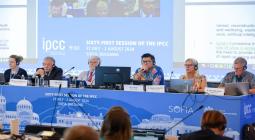‘Blatant Political Capture’ Feared as Saudi Aramco Economist Nominated to Lead IPCC Science Role
The United Nations’ top climate science body is embroiled in an intense debate over appointing a veteran executive from one of the world’s most aggressive oil and gas companies as a lead author for its next report on oil and gas emission reductions.
Mustafa Babiker, who’s worked for nearly two decades as an economist with Saudi Arabia’s state oil company, Saudi Aramco, has been nominated as one of three coordinating lead authors for a key chapter of the next assessment report by the Intergovernmental Panel on Climate Change (IPCC)—the one that advises governments on how to reduce greenhouse gas emissions from fossil fuels.
The report is due in 2028, though there’ve been persistent reports that it may be delayed.
“The nomination of a longtime employee of Aramco as coordinating lead of the Government Policies chapter for this next IPCC report is one the most blatant examples of political capture by the oil industry of climate policy that I have ever seen. This is exactly why we are failing to move forward to increase climate ambition in domestic policy and international negotiations,” Tzeporah Berman, founder of the Fossil Fuel Non-Proliferation Treaty secretariat, told The Energy Mix in an email statement.
“The oil companies will never manage their own decline,” Berman added. “The oil companies’ infiltration of policy reports and negotiations is holding the world hostage to the systems of the past that benefit polluters at the expense of lives and livelihoods. It is holding us back at a crucial moment in history when we are running out of time to mitigate the worst impacts of climate change caused by the continued expansion of oil, gas, and coal.”
The ‘Foundation of Human Understanding’
The IPCC’s central role as a beacon for climate science is what makes Babiker’s nomination such an important, high-stakes moment.
“The IPCC’s findings are the foundation of human understanding of climate change, guiding governments and investors on future decisions,” Politico reports. “As such, they face intense scientific and political scrutiny.”
Babiker “is a qualified academic with a long history of contributions to IPCC publications, including leading a chapter of its last major report,” writes veteran climate reporter Karl Mathiesen. “But observers and some scientists worry that commissioning an 18-year veteran of the world’s largest oil company to lead such key work could harm the IPCC’s credibility as the world’s arbiter of climate science.”
No decision on Babiker’s role has been made, Mathiesen writes. But one unnamed insider told him the nomination “damages the reputation of the IPCC… and this may well be deliberate.”
Politico has more on how the IPCC process is becoming “much more politicized and financialized,” in the words of Vice-Chair Diana Urge-Vorsatz.
Neither Aramco nor the IPCC responded to Mathiesen’s requests for comment. An official spokesperson for Saudi Arabia’s climate delegation said the country “holds the work of the IPCC in the highest regard and is committed to upholding the scientific integrity and independence of its processes.”
But that’s not the way the Saudi delegation has behaved at recent IPCC meetings or United Nations climate summits.
Obstructing Climate Science
When countries gathered in Incheon, South Korea in October 2018 to adopt the IPCC’s Special Report on 1.5°C, Saudi Arabia did its best to stymie the effort to ground global climate policy in sound climate science. “Oil giant Saudi Arabia is seeking to block adoption of a key UN climate change report unless a passage highlighting the inadequacy of national carbon-cutting pledges is removed or altered,” Agence France-Presse reported at the time.
“We are very concerned that a single country is threatening to hold up adoption of the IPCC Special Report if scientific findings are not changed or deleted according to its demands,” said one meeting participant, who declined to be identified.
“This has become a battle between Saudi Arabia, a rich oil producer, and small island states threatened with extinction,” added another participant.
“The Saudis have been running interference across the board, on main and minor issues,” said a third.
Although IPCC processes didn’t allow countries to alter the science in the main report on 1.5°C scenarios, the battle lines were drawn over the 20-page summary for policy-makers (SPM)—the shorter, more readable synthesis intended to give non-scientist decision-makers a basis for action.
“Under the IPCC’s consensus rules, all countries must sign off on the language” in the SPM, AFP explained. “At issue is a passage in the summary stating that voluntary national commitments to reduce greenhouse gas emissions, annexed to the 2015 Paris climate treaty, will fail to limit warming to 1.5°C.”
Even at that time, the news agency added, Saudi Arabia had “a long track record of raising questions and objections within UN climate forums.”
In Incheon, they almost succeeded. But in the end, “this process really drove home the fact that science can’t be negotiated,” said Catherine Abreu, now director of the International Climate Politics Hub, who led the non-government delegation to the 1.5°C negotiations in her previous role as executive director of Climate Action Network-Canada.
Touting a High-Carbon Future
At the UN’s COP28 climate summit in Dubai in 2023, Saudi Arabia was identified as one of the petrostates seeking to water down “polarizing promises to ‘phase out’ fossil fuels” in favour of compromise language calling on nations to “swiftly transition away” from those products—a linguistic nuance that may mean little in the real world, but was significant in the world of climate diplomacy. The petrostates’ preferred language found its way into the final COP28 decision, but a year later Saudi Arabia was back, looking to roll back the agreement in the lead-up to COP29 in Baku, Azerbaijan.
“Negotiators from five western countries told the Financial Times that they were applying pressure to Azerbaijan… to prioritize fossil fuel phaseout discussions, in an attempt to counter a ‘pushback’ from the petrostates and their allies,” the paper wrote at the time. “But the negotiators said that a group of countries including Saudi Arabia, Russia, and Bolivia—which have historically proved a block to any global agreement to phase out the use of fossil fuels—were yet again frustrating progress.”
Elsewhere, Aramco CEO Amin Nasser was going all-in on promoting a future of continued oil and gas expansion.
“We should abandon the fantasy of phasing out oil and gas and instead invest in them adequately, reflecting realistic demand assumptions,” he told participants at the oil and gas industry’s annual CERAWeek conference in March 2024. Those assumptions, he said, had oil consumption hitting a record 104 million barrels per day last year and continuing to grow through 2045.
“The current [energy] transition strategy is visibly failing on most fronts,” Nasser added. “And, despite our starring role in global prosperity, our industry is painted as transition’s arch-enemy.”
Cover photo: IISD/ENB, Sean Wu via wikimedia commons





